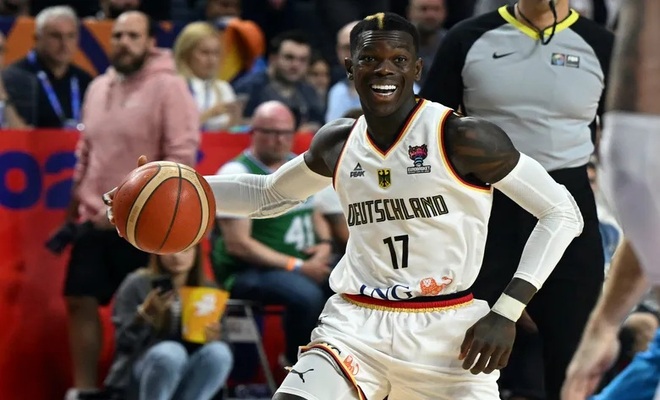-
 September 14, 2025, 6:05 am
September 14, 2025, 6:05 amLast Updated on September 14, 2025 6:05 am by André Lemos | Published: September 14, 2025
Forty minutes. Two undefeated teams. One gold medal. This is the climax of EuroBasket 2025 and the stage couldn’t be brighter. Türkiye and Germany have navigated a gauntlet of Europe’s best, blending star power with disciplined team play, to reach the final. For Türkiye, it’s a chance at a first-ever crown; for Germany, the rare pursuit of a World Cup–EuroBasket double. On paper, it’s a classic battle of size versus speed, interior dominance versus perimeter creativity and the winner will be the team that bends the other to their rhythm.
Meanwhile, the bronze medal game offers its own drama. Greece and Finland arrive with contrasting histories and motivations. Finland chase their first-ever podium finish, powered by Lauri Markkanen and a seamless, ball-movement–driven offense. Greece, still reeling from a semifinal setback, lean on Giannis Antetokounmpo to end a 16-year medal drought. In Riga, pride, legacy and tactical chess all collide, proving that EuroBasket isn’t just a tournament; it’s a high-stakes test of resilience, talent, and strategy.
Gold Medal Preview: Türkiye vs Germany
24 teams started this summer with the dream of calling themselves Kings of Europe. For most, it was a dream too far. For two, the road ends where it always should: under the brightest lights, in the biggest game on the continent. Türkiye and Germany arrive here undefeated, the two best teams in the tournament, now 40 minutes away from history.
For Türkiye, Riga has been home. Eight games, eight wins, including scalps of Serbia, the hosts and Giannis’ Greece. This is no Cinderella run. This is dominance and it’s delivered them to only their second EuroBasket final, searching for their first ever crown. For Germany, the path has been equally flawless. Five wins on Finnish soil to open, three more in Riga, and the best NET rating in the field (+34.3). They’ve been the tournament’s best offense and its third-best defense, all while hunting something exceedingly rare: the World Cup–EuroBasket double. If that doesn’t give them an edge in motivation, what will?
At the core of Türkiye’s rise is Alperen Sengün, who has looked every bit like an MVP candidate. He’s averaging a cool 21-11-7 and running the offense from his sweet spot on the left block. He can score there, yes, but more devastatingly he can pick apart defenses as a playmaker, spraying passes to cutters or forcing rotations that lead to clean catch-and-shoot looks. The brilliance of this team is that it’s not a one-man show. Shane Larkin is the steadying hand, picking his moments but always ready to punish gaps. Cedi Osman has been one of the best two-way wings in Riga, knocking down 50% of his threes on six attempts per game and guarding up and down the positional spectrum. And then there’s Ercan Osmani, whose performance against Greece (28 points, 6/8 from deep, while making Giannis’ life miserable defensively) elevated him from role player to centerpiece in one night. Add Sehmus Hazer’s defensive pressure and Türkiye’s physicality across the rotation and you have a machine that can grind you down possession by possession.
Germany’s formula is very different, but no less effective. Their offense is a two-headed monster, with Dennis Schröder and Franz Wagner sharing creation duties. Schröder’s speed bends defenses, while Wagner’s size, strength and versatility punish whatever coverage you throw at him. Around them is perhaps the best supporting cast in EuroBasket: multiple shooters, multiple secondary playmakers and the ability to run in transition or calmly dissect you in the halfcourt. Andreas Obst, the best pure shooter in Europe, has been quiet by his standards, which makes him feel due for the kind of outburst we saw against Team USA at the World Cup. Their defense, built around switching, has been stingy. And as a collective, this group just doesn’t beat itself.
So what does it look like when these two meet in the middle of the court?
Start inside. Türkiye will have a clear frontcourt advantage. Sengün versus Daniel Theis is a fair fight, but Germany lacks depth behind him. With Mo Wagner injured and Johannes Voigtmann sidelined, Germany’s only real alternative is Johannes Thiemann. That means Bonga likely stays at the four, and Germany can’t replicate Türkiye’s two-big lineups. Türkiye will test that weakness, hammering the glass (they grab almost 40% of available offensive rebounds) and forcing Germany to decide between overcommitting to Sengün or letting him go to work. Overhelp and you’re cooked by shooters. Stay home and Sengün has his way.
On the flip side, Germany’s challenge is to make Türkiye uncomfortable guarding in space. Hazer will be tasked with hounding Schröder, Cedi Osman likely draws the Franz Wagner assignment, but as always with stars the responsibility is collective. Türkiye has been superb at hedging ball screens aggressively and rotating behind the play. Against most teams, that’s been enough. Against a group as skilled and unselfish as Germany, that’s a bigger gamble. If Schröder can slip out of those traps and keep the ball moving, Germany’s spacing will punish even small breakdowns.
The game may well swing on pace. Germany loves possessions, the more the better and thrives when Schröder gets downhill before the defense is set. Türkiye is the opposite: they only run when the path is clear, preferring to make you defend them for 20 seconds in the halfcourt until Sengün finds an angle. Whoever imposes their tempo holds the cards.
And then there’s the three-point line. These are the two best shooting teams in the tournament: Türkiye leads at 44.7%, Germany sits just behind at 39%. Both can rain triples, but the key isn’t just makes, it’s timing. A quick 9-0 run off catch-and-shoot looks could blow the game open. Misses at the wrong moment could be fatal. Obst, again, looms large here as Germany’s potential X-factor.
The final layer? Guard play in crunch time. In tight games, decision-making and shot creation tilt the scales and there Germany has the edge. Schröder is one of the best closers in international basketball and Wagner has the tools to create his own look in ways few others here can. Türkiye will rely on Sengün to orchestrate under pressure, but if Germany forces him into late-clock situations, the advantage flips.
The truth is this game offers no obvious mismatch that decides it before tipoff. Türkiye’s size and interior dominance versus Germany’s perimeter creation and pace is a stylistic collision. Sengün will get his, Schröder and Wagner will get theirs. The winner will be the team that controls the little things: rebounding, turnovers, tempo, and bends the other to play on their terms.
If pressed to choose, Germany’s backcourt depth and ability to generate offense in a close fourth quarter makes them a slight favorite. But Türkiye has been flawless in Riga, and they won’t care about what looks tidy on paper. They’ve carved out an identity as the most physical, disciplined halfcourt team here, and they’ll make Germany earn every inch.
So, one last time this summer: 40 minutes, two unbeaten teams and a gold medal waiting at the end. Whoever survives won’t just win a game. They’ll plant their flag as Europe’s best and hold that crown for the next four years.
Bronze Medal Game Preview: Greece vs Finland
The bronze medal game always carries a strange mix of pride and heartbreak. Both teams came to Riga with dreams of Sunday night glory, only to fall short one step from the final. But there is still a medal at stake and for these two national teams it would carry massive significance: Finland chasing their first podium in history, Greece looking to end a 16-year drought.
Finland arrive with momentum from a breakthrough run, fueled by the belief and togetherness that has defined their “Wolfpack” identity. Their offense is built on pace, spacing, and constant motion, producing some of the sharpest halfcourt execution in the tournament. Ball movement is a strength, they average nearly 23 assists per game and the bench has been consistently impactful, keeping them balanced even when Lauri Markkanen hasn’t been at his best. Against Germany, Lauri struggled to impose himself, but the stage here sets up as a chance for redemption. He’ll have the ball, the system around him, and the motivation to cement his place as the leader of a historic Finnish moment.
Greece come in with different energy. Their semifinal against Turkey was a disappointment, as turnovers and stagnant play left them chasing the game from the start. Still, this team has the star power to shift the narrative in one afternoon. Giannis Antetokounmpo has been the focal point all tournament, but controlling him requires more than just one defender, it takes an entire defensive plan. Finland will likely start with Jantunen on him and rotate size and fouls his way, but the more important battle may actually come at the other end. If Finland can limit turnovers and avoid feeding Greece’s transition game, they’ll cut off the easiest source of Giannis points.
The head-to-head between Lauri and Giannis is the obvious storyline, two NBA stars who dominate in completely different ways. Giannis brings relentless rim pressure and physical mismatches, while Lauri thrives in a five-out system, stretching defenses, attacking from movement, and punishing switches with touch and length. Greece will probably look to Papanikolaou to chase him, but Markkanen is a unique problem: a 7-footer who moves like a guard and thrives when the ball zips through multiple hands before finding him.
Shooting could be the hidden swing factor. Greece have been more efficient from deep, but Finland take and make more threes. A hot stretch from either side could decide momentum in what should be a tightly contested game.
For Finland, it’s the chance to make history. For Greece, it’s a chance to salvage pride and bring hardware home for the first time since 2009. Both teams have stars, both teams have scars from the semifinals. The question now: who has the resilience to turn disappointment into something lasting?
This article was written by the European Hoops team: André Lemos, João Caeiro, Tiago Cordeiro and Diogo Valente. Follow us on Twitter at @EthosEuroleague for more updates!
